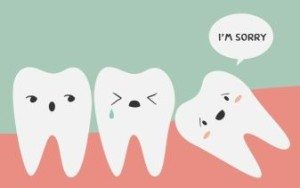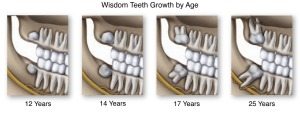True Wisdom About Wisdom Teeth
by Dr. James Lotakis, DDS, MA 
Occasionally I come across a misguided article attempting to purport that wisdom tooth removal is unnecessary and even potentially harmful. Interestingly enough, these little epistles rarely have any scientific basis from the dental or medical community and are often the musings of self-appointed “experts” who have decided they know what’s best for you. I thought it was time for some straight talk about wisdom teeth so that you can make a wise decision when it comes to yours.
In the world of dental care, few practices and procedures can be labeled universally beneficial. Beyond regular brushing, flossing and cleaning, I would be hard pressed to think of any. Sugarless gum seems to be a pretty good idea, but apparently only four out of five us agree on that. As for wisdom teeth, each patient’s situation will be unique and has to be evaluated on its own merits.
If wisdom teeth are a problem or potential problem, I’m going to recommend removal. It’s that simple. Not doing so puts the patient at risk for tooth decay, gum disease, bacterial infection, cyst and tumor formation, and interference with adjacent dental structures. Conversely, if the wisdom teeth are in occlusion (well aligned during chewing or at rest), the patient is keeping them clean, and they aren’t creating any apparent problems, we may decide it’s best to leave them alone.
 So why do so many patients have their wisdom teeth removed? Well, unlike you, wisdom teeth do not get better with age. Even in patients who exhibit problem-free wisdom teeth, research consistently shows greater success in avoiding gum disease, adjacent tooth loss and difficult wisdom tooth extraction for those who have their wisdom teeth removed by age 25.
So why do so many patients have their wisdom teeth removed? Well, unlike you, wisdom teeth do not get better with age. Even in patients who exhibit problem-free wisdom teeth, research consistently shows greater success in avoiding gum disease, adjacent tooth loss and difficult wisdom tooth extraction for those who have their wisdom teeth removed by age 25.
Asymptomatic wisdom teeth can be deceptive. Gum disease-causing bacteria can fester around or below pain-free wisdom teeth and cause significant damage before symptoms finally appear and indicate problems. A nine-year study out of UNC Chapel Hill found that patients who keep what appear to be problem-free wisdom teeth greatly increase their risk for gum disease. Another study found the presence of wisdom teeth in 18- to 34-year-olds doubled their odds of finding gum disease on adjacent teeth.
To summarily dismiss wisdom tooth removal as unnecessary would be very unwise indeed. A better approach is to talk with your dentist openly, and carefully evaluate the risks and benefits of wisdom tooth removal based on your individual circumstances. Together, I’m sure you’ll make the right decision to ensure you maintain optimal dental health.
Dr. James Lotakis, DDS, MA practices general dentistry with Dentistry of the Carolinas in Charlotte, N.C. A graduate of New York University College of Dentistry, he is also a member of the American Dental Association, North Carolina Dental Society, Academy of General Dentistry and the American Academy of Cosmetic Dentistry.
